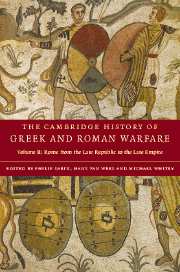Book contents
- Frontmatter
- Part I The Late Republic and the Principate
- 1 International relations
- 2 Military forces
- 3 War
- 4 Battle
- 5 Warfare and the state
- 6 War and Society
- Part II The later Roman Empire
- Chronological table
- Glossary
- List of ancient authors
- Bibliography
- Index of ancient passages cited
- General index
- Map 6. The provinces under Trajan."
5 - Warfare and the state
from Part I - The Late Republic and the Principate
Published online by Cambridge University Press: 28 March 2008
- Frontmatter
- Part I The Late Republic and the Principate
- 1 International relations
- 2 Military forces
- 3 War
- 4 Battle
- 5 Warfare and the state
- 6 War and Society
- Part II The later Roman Empire
- Chronological table
- Glossary
- List of ancient authors
- Bibliography
- Index of ancient passages cited
- General index
- Map 6. The provinces under Trajan."
Summary
MILITARY FINANCE AND SUPPLY
Dominic Rathbone
The extant literature of the Roman world of the late Republic and Principate has only occasional brief references to soldiers’ pay, preparations for particular campaigns and the burden of military expenses. No coherent discussion survives of the financing of the Roman army, let alone of the economics of Roman war. The province of Egypt furnishes a broad but random sample of records on papyrus and ostraca from the first to third centuries A.D. (and beyond), mostly about supplies, which is supplemented by sparse documents elsewhere, notably the tablets from Vindolanda (Britain) and Vindonissa (Upper Germany), the Bu Njem ostraca (Africa) and Dura-Europus papyri (Mesopotamia). Soldiers’ dedicatory and funerary inscriptions, of which the richest concentration is from Lambaesis (Africa), occasionally help, and other archaeological finds in and around military camps, mainly in the north-western provinces, represent further potential data on the military economy.
the remuneration of soldiers
In the long first century B.C., as part of the revolution from Republic to Principate, the Roman army was transformed from an annual peasant levy to a standing professional force (see pp. 30–7 above), although formal recognition of changes often lagged behind them. The Republican ideology that legionary service was restricted to property-owners who could arm and maintain themselves lived on into the second century A.D., although landless volunteers must have been enrolled in large numbers from the late third century B.C., and their recruitment had supposedly been regularized in 107 B.C. by Marius.
Keywords
- Type
- Chapter
- Information
- The Cambridge History of Greek and Roman Warfare , pp. 158 - 197Publisher: Cambridge University PressPrint publication year: 2007



